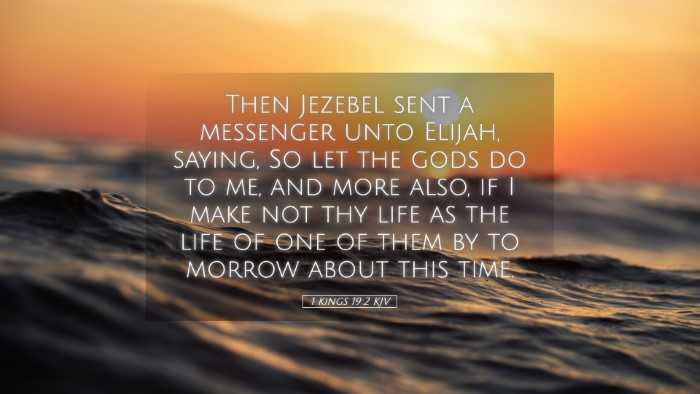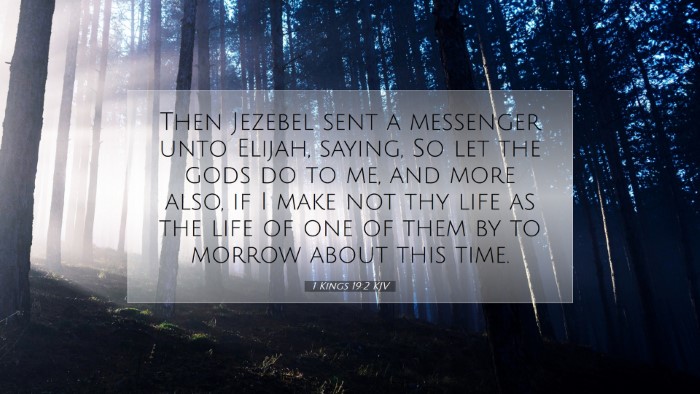Old Testament
Genesis Exodus Leviticus Numbers Deuteronomy Joshua Judges Ruth 1 Samuel 2 Samuel 1 Kings 2 Kings 1 Chronicles 2 Chronicles Ezra Nehemiah Esther Job Psalms Proverbs Ecclesiastes Song of Solomon Isaiah Jeremiah Lamentations Ezekiel Daniel Hosea Joel Amos Obadiah Jonah Micah Nahum Habakkuk Zephaniah Haggai Zechariah Malachi1 Kings 19:2
1 Kings 19:2 KJV
Then Jezebel sent a messenger unto Elijah, saying, So let the gods do to me, and more also, if I make not thy life as the life of one of them by to morrow about this time.
1 Kings 19:2 Bible Commentary
Analysis of 1 Kings 19:2
Verse (1 Kings 19:2): "Then Jezebel sent a messenger unto Elijah, saying, So let the gods do to me, and more also, if I make not thy life as the life of one of them by tomorrow about this time."
Context and Background
The backdrop of this verse is critical to understanding its significance. Elijah had just triumphed over the prophets of Baal on Mount Carmel, demonstrating the power of Yahweh (1 Kings 18:20-40). However, the victory was short-lived as Elijah faced the wrath of Queen Jezebel.
This verse marks a turning point in Elijah's prophetic ministry, highlighting the tension between faithfulness to God and the fierce opposition from a corrupt regime.
Jezebel's Threat
Jezebel's Communique: Her message, delivered by a messenger, was a bold proclamation of intent to kill Elijah. This stark threat reveals her ruthless disposition and serves as a foil to Elijah's recent demonstration of faith.
- Motivation: Jezebel aims to maintain her religious influence and the worship of Baal, which Elijah had openly challenged.
- Context of Threat: Her invocation of the gods serves as a solemn oath, not only to intimidate Elijah but to place herself in a position of divine authority.
Theological Implications
This verse illustrates the conflict between divine authority and human rebellion. The responses of both Elijah and Jezebel provide rich material for theological examination:
- The Nature of True Prophecy: Elijah's role as a prophet is both affirmed and threatened. His previous success does not shield him from persecution.
- The Cost of Faithfulness: The resolve of Jezebel to eliminate those who would oppose her reflects the dangers faced by those who stand firm in their faith.
Comparative Commentary
Matthew Henry: Henry emphasizes the audacity and cruelty of Jezebel's threat. He notes that despite Elijah's great spiritual victories, he is not exempt from personal danger. Henry points out the psychological impact of fear on Elijah, showing how even the strongest believers can waver when faced with stark threats.
Albert Barnes: Barnes interprets Jezebel’s message as a significant misrepresentation of power. He discusses how her reliance on the pagan deities signifies a deep spiritual blindness, contrasting it with the unwavering faithfulness that Elijah represents.
Adam Clarke: Clarke underlines the implications of Jezebel's words as a desperate attempt to cling to power. He elaborates on the irony of her invoking the gods, noting that true power lies in obedience to Yahweh, evidenced by the outcome of Elijah's previous encounter on Mount Carmel.
Application for Modern Readers
This verse begs contemporary readers to reflect on the following:
- The Reality of Opposition: Believers may face significant challenges and threats, reminiscent of Elijah’s fears, reminding us that faith does not equate to protection from worldly dangers.
- The Call to Courage: Just as Elijah was called to stand firm in adversity, today’s believers are urged to uphold their faith boldly, despite societal pressures.
- The Importance of Community: Isolation can lead to despair, as seen in Elijah's response to Jezebel's threat. Fellow believers can serve as vital support systems when facing overwhelming circumstances.
Concluding Thoughts
1 Kings 19:2 encapsulates a moment of profound conflict that resonates across generations. The challenges faced by Elijah serve as a reminder of the precarious nature of faith against hostile forces. The text encourages pastors, students, and theologians to grapple with the realities of faith in the face of opposition and to draw strength from God’s promise and presence, understanding that human threats cannot ultimately thwart divine purpose.


